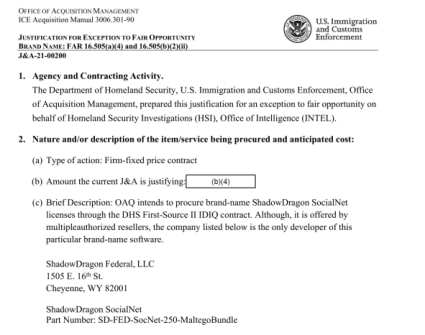The Federal Trade Commission Must Investigate Meta and X for Complicity with Government Surveillance
Page Media

When you created your Facebook, Instagram, or Twitter account, did you think you were signing up to have the government spy on you? That your personal information — who you are, what you say, what you do, your friends, and your political views — could be tapped by surveillance companies and sold to police, deportation agencies, and other local, state, and federal forces?
In 2016, the ACLU of Northern California blew the whistle on how private surveillance vendors were using Facebook and Twitter to help police target Black Lives Matter activists. As a result of advocacy by the ACLU of Northern California, MediaJustice, and Color of Change, both Facebook and Twitter strengthened their anti-surveillance policies and cut off access to social media surveillance companies.
In the years that followed, both companies have repeatedly gone on record, as recently as 2021, to reassure the public that they do not give surveillance companies special access to users’ personal information.
But are Meta and X keeping their promises? Documents uncovered in further investigations show that there are still strong causes for concern.
That’s why the ACLU of Northern California, the Brennan Center, and the ACLU are calling on the Federal Trade Commission to investigate whether Meta and X have broken their anti-surveillance commitments. If they have, it could qualify as a deceptive business practice under Section 5 of the FTC Act. And it could also violate separate consent orders placed on them by the FTC.
The world of social media is very different than it was in 2016. Both Meta and X have been rocked by scandal and tumult (and they’ve also changed their names). On the technological side, the explosive growth of artificial intelligence has the potential to supercharge surveillance, posing serious dangers to the safety of immigrants, overpoliced Black and Brown communities, activists, LGBTQ people, and those in need of abortions and reproductive care.
It’s more important than ever that the FTC takes a hard look at whether Meta and X are actually following their policies and their promises to the public.
Here are three questions that should lead the agency’s investigation.
Can people trust the promises that Meta and X have made to protect them from government surveillance?
The strongest evidence that Meta and X aren’t following their own anti-surveillance policies comes from surveillance vendors themselves.
Companies like Dataminr (an official “partner” of X), Babel Street, Skopenow, Media Sonar, and ShadowDragon publicly claim that they have access to data from Meta and/or X. Those companies sell their services, data, and products — which appear to operate at extraordinary scale — to police and other government agencies through contracts that can be extremely lucrative.
Investigations and public records requests and lawsuits by the ACLU of Northern California, the Brennan Center and others have uncovered marketing materials, emails, training manuals, and contracts between surveillance companies and government agencies.
https://www.brennancenter.org/our-work/research-reports/lapd-social-media-monitoring-documents
These materials suggest that law enforcement agencies are getting deep access to social media companies’ stores of data about people as they go about their daily lives.

Something’s not right. If these companies can really do what they advertise, the FTC needs to figure out how.
How are surveillance vendors accessing people's personal social media information?
The scale and scope of social media surveillance products are frightening. They potentially give the government the power to compile and analyze many millions of social media posts and user activity, a mind-boggling amount of data.
It’s unlikely that these surveillance systems could operate at this scale without Meta and X allowing some kind of special access to user data.
The public deserves answers, and the FTC must investigate how surveillance vendors are still accessing user data.
Surveillance companies stand to make millions off government contracts. We know their clients include local and state police departments, the Department of Defense, the Drug Enforcement Administration, and the Department of Homeland Security and its component agencies, Customs and Border Protection and Immigration and Customs Enforcement. And as we describe in our letter to the FTC, we’ve seen the government use social media in ways that cause intolerable harm to communities already in harm’s way.
Do Meta and X have enough dedicated staff to enforce their policies and ensure that developers aren’t using their special access for surveillance?
There have been layoffs in “trust and safety” and policy programs at the social media companies, raising concerns about whether Meta and X have the necessary staff to enforce their anti-surveillance policies.
It’s not enough to rely on a posted policy alone to deter surveillance vendors. There must be robust implementation, auditing structures, and enforcement mechanisms to comply with these public commitments.
We call on the Federal Trade Commission to ensure that what Meta and X tell people publicly lines up with their actual practices. With all the evidence raising serious questions about Meta and X’s anti-surveillance commitments, the agency should act swiftly to ensure people’s privacy is being properly protected.
